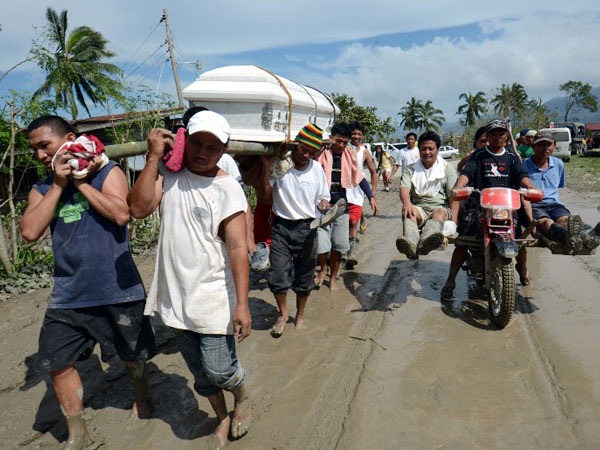475 dead, many homeless in wake of ‘Pablo’

Residents carry the coffin of a dead relative in New Bataan town, compostela province on December 6, 2012. Nearly 200,000 people are homeless and more than 475 dead after the Philippines suffered its worst typhoon this year, authorities said on December 6, reaching out for international aid to cope with the scale of the disaster. AFP/TED ALJIBE
NEW BATAAN, Philippines – Nearly 200,000 people were homeless and 475 confirmed dead after the Philippines’ worst typhoon this year, officials said Thursday, as the government appealed for international help.
Typhoon “Pablo” (international name typhoon Bopha) ploughed across Mindanao island on Tuesday, flattening whole towns in its path as hurricane-force winds brought torrential rain that triggered a deadly combination of floods and landslides.
Erinea Cantilla and her family of six walked barefoot for two days in a vain search of food and shelter through a muddy wasteland near the mountainous town of New Bataan after the deluge destroyed their house and banana and cocoa farm.
“Everything we had is gone. The only ones left are dead people,” Cantilla told AFP as her husband, three children and a granddaughter reached the outskirts of the town, which itself had been nearly totally obliterated.
The Army said it was looking for at least 377 missing people while seeking help for more than 179,000 others who sheltered in schools, gyms and other buildings after losing everything.
Article continues after this advertisementOfficials said many victims were poor migrants who flocked to landslide-prone sites like New Bataan and the nearby town of Monkayo to farm the lower slopes of mountains or work at unregulated mines in the gold rush area.
Article continues after this advertisementOf the dead, 258 were found on the east coast of Mindanao while 191 were recovered in and around New Bataan and Monkayo, said Major-General Ariel Bernardo, head of an Army division involved in the search.
The civil defence office in Manila said 17 people were killed elsewhere in Mindanao along with nine in the central Visayan islands.
“We still have more than 377 missing and our challenge now is really to try to get to them,” he told AFP.
Shell-shocked survivors scrabbled through the rubble of their homes to find anything that could be recovered, as relatives searched for missing family members among mud-caked bodies laid out in rows on tarpaulins.
Civil defence chief Benito Ramos refused to give up hope for the missing.
“There is no time limit — as long as it takes,” he told reporters when asked how long the search and rescue effort would take.
One man was rescued after being trapped for two days under rocks and debris after flash floods swept away his entire family.
Covered in mud and teary-eyed, Carlos Agang recounted how a small community of banana and coconut farmers was devastated as Bopha unleashed a wall of water.
“It’s a miracle that I survived, but I might as well be dead,” he said.
President Benigno Aquino III has sent food and other supplies by ship to 150,000 people on Mindanao’s east coast where three towns remain cut off by landslides and wrecked bridges, Interior Secretary Manuel Roxas II said.
Social Welfare Secretary Corazon Soliman said the government had sought help from the Swiss-based International Organisation for Migration to build temporary shelters to ease the pressure on evacuation camps.
“The priority is to build bunkhouses so that there will be shelter for them,” she said on television news show.
The United States and Japan said they had offered emergency assistance.
Geologist Mahar Lagmay, head of a government project to map out all flood-prone areas of the country, said that while most people in the affected communities were aware of the danger, they did not know where to go for safety.
“Year after year, whenever there is heavy rain that comes to that place, there are landslides and many people die in those mountainous areas,” he said.
Workers were struggling to reach villages due to destroyed roads and wrecked bridges, but finding corpses was not a problem due to the overpowering stench everywhere, said Francisco Macalipay, a soldier involved in the rescue.
“Just let your nose lead you to them,” he told AFP.
“In a week’s time I’m sure the smell of death would force the survivors to flee the town.”